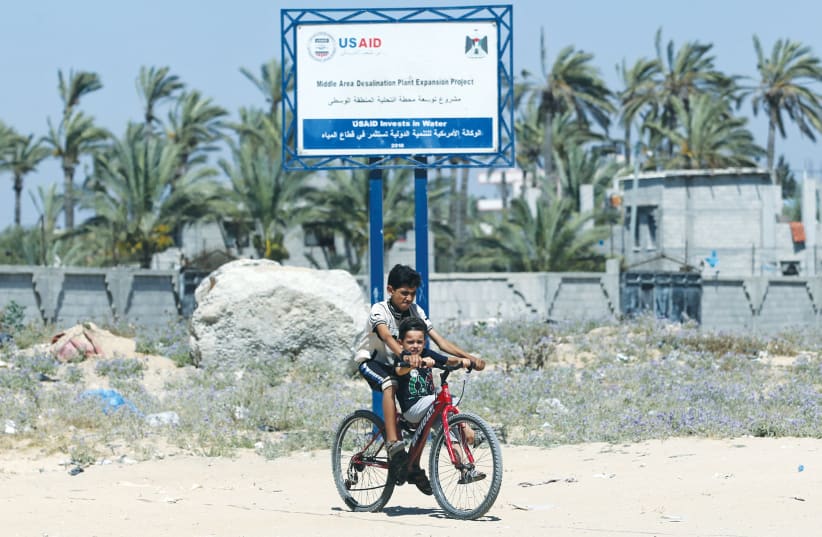Former president Ronald Reagan understood the importance of creating, maintaining and strengthening strategic international alliances to further American foreign policy. On May 31, 1982, during a Memorial Day speech at Arlington National Cemetery, president Reagan remarked, “We must understand enough about our world to see the value of our alliances. We must be wise enough about ourselves to listen to our allies, to work with them, to build and strengthen the bonds between us.”
Similarly, USAID, appropriately headquartered in the Ronald Reagan Building in Washington, DC, should continue to build on the successful work of former administrator Mark Green who forged new strategic alliances in the development sector to increase burden sharing and better coordinate efforts to tackle development challenges.
For instance, as the United Arab Emirates, Sudan, Bahrain, and Morocco normalized relations with Israel through the Abraham Accords, USAID was already proactively collaborating with Israel and the UAE to reach groundbreaking agreements to enhance development cooperation and assist countries to become self-reliant.
In February 2018, Ambassador Green met with Ron Dermer, the former Israeli ambassador, to create a new visionary framework for a global memorandum of understanding between USAID and its Israeli development counterpart, MASHAV. We sought to take advantage of the expertise and innovation in Israel as the Start-Up Nation to harness the ingenuity of Israel’s robust technological sector to strengthen development programs in developing countries globally.
One month later, Green continued his priority of forging new partnerships and met with UAE Ambassador Yousef Al Otaiba. While much of the conversation centered around Yemen, both sides agreed that there were opportunities for the UAE and USAID to collaborate further in countries beyond the Middle East, specifically in Africa and potentially even in Latin America.
In August 2019, we traveled to Israel and met with then-prime minister Benjamin Netanyahu and signed the MoU with the Israeli Foreign Ministry and MASHAV. To my knowledge, this was the first time a USAID administrator had met with the prime minister of Israel. At the signing, Green stated, “It’s only natural that our two development agencies work together. After all, we very much share the same vision. MASHAV’s vision to empower other nations to improve their own lives closely parallels USAID’s goal of fostering self-reliance.”
CONGRESS HELPED cement this new strategic initiative with Israel by introducing several bipartisan bills culminating in the Fiscal Year 2021 appropriations of $2 million dollars to promote the USAID-Israel international development cooperation. The Fiscal Year 2021 National Defense Authorization Act also included language to support the USAID MoU “to advance common goals on energy, agriculture, food security, democracy, human rights, governance, economic growth, trade, education, environment, global health, water and sanitation, with a focus on strengthening mutual ties and cooperation with nations throughout the world.”
The UAE is investing millions in development and agriculture sectors in Africa and the Middle East. Partnering with the UAE was strategic and in February 2020, Green dispatched me, as his national security advisor, to lead a small team to the UAE. While there, we met with the Minister of State of Foreign Affairs and International Cooperation HE Reem Ebrahim Al Hashimy to discuss our mutual foreign policy priorities to assist developing countries in sub-Saharan Africa, the Middle East, and Latin America. We decided then to move forward on a MoU and in October 2020, former USAID deputy administrator Bonnie Glick traveled to the UAE to sign USAID’s first MoU with an Arab nation. At the signing, Glick recognized that “the UAE has stepped up dramatically as a major donor of development and humanitarian assistance within the international community.”
The MoUs with Israel and the UAE establish an important foundation to share technical expertise and resources in developing countries. With the recent unfortunate news that the development agency in the United Kingdom may reduce its foreign assistance budget, new alliances are needed now more than ever in the development sector.
To help in the Indo-Pacific region, USAID can expand its partnership with Australia to foster development goals. In Latin America, Colombia and Taiwan can be key partners to help the region. USAID has previously designated Morocco as a trade hub under Prosper Africa that can be leveraged to expand economic opportunities in sub-Saharan Africa. Lastly, we worked with Congress to authorize a development foundation that can help incentivize the private sector in India to confront development challenges globally.
America’s alliances can be force multipliers. To further empower all of the three Ds, development through USAID should expand, embrace, and strengthen its own alliances, including with unconventional partners, to better achieve US foreign policy objectives and national security interests abroad, including combating nefarious activities by China and Russia.
The writer is chief of staff and senior advisor to Ambassador Mark Green, president and CEO of the Woodrow Wilson International Center for Scholars. He was formerly the national security adviser at the US Agency for International Development and former senior foreign policy adviser and staff director for the Subcommittee on the Middle East and North Africa for Congresswoman Ileana Ros-Lehtinen (R-Florida) on the House Foreign Affairs Committee.
